If you’ve ever associated yourself with a zodiac sign, chances are you’ve heard of Ophiuchus. But what exactly is Ophiuchus, and why is it such a controversial topic? Ophiuchus is often referred to as the 13th zodiac sign, causing confusion and intrigue among astrology enthusiasts. In this article, we will explore the origins of the zodiac, delve into the controversy surrounding Ophiuchus, differentiate between astronomical and astrological zodiacs, discuss the precession of the equinoxes, explore the traits and compatibility of Ophiuchus, and address the scientific consensus on astrology. So, whether you’re a believer in astrology or a skeptical observer, join us on this journey to uncover the truth behind Ophiuchus and its place in the astrological world.
Contents
- The Origin of the Zodiac
- What is Ophiuchus?
- The Ophiuchus Controversy
- Astronomical vs Astrological Zodiac
- The Precession of the Equinoxes
- Ophiuchus Traits and Compatibility
- Scientific Consensus and Astrology
- Conclusion
-
Frequently Asked Questions
- What is the significance of Ophiuchus in astrology?
- Why was Ophiuchus excluded from the traditional zodiac?
- Does the inclusion of Ophiuchus change my astrological sign?
- What are the traits associated with Ophiuchus?
- Can Ophiuchus be considered the “new” or “13th” zodiac sign?
- Are Ophiuchus individuals compatible with other zodiac signs?
- Do astronomers consider Ophiuchus a zodiac sign?
- Is Ophiuchus only associated with astrology or does it have a connection to astronomy as well?
- Why has Ophiuchus gained popularity in recent times?
- What does the controversy surrounding Ophiuchus mean for astrology’s credibility?
- References
-
Frequently Asked Questions
- 1. Is Ophiuchus a new zodiac sign?
- 2. Why is Ophiuchus not included in the zodiac?
- 3. What are the characteristics of Ophiuchus?
- 4. Can Ophiuchus be compatible with other zodiac signs?
- 5. Does the existence of Ophiuchus change my zodiac sign?
- 6. Is Ophiuchus mentioned in ancient astrology texts?
- 7. Can Ophiuchus influence my horoscope?
- 8. Are there any famous people born under the sign of Ophiuchus?
- 9. Do astronomers consider Ophiuchus as a zodiac sign?
- 10. Is Ophiuchus an important part of astrology debates?
- References
- Read More
The Origin of the Zodiac
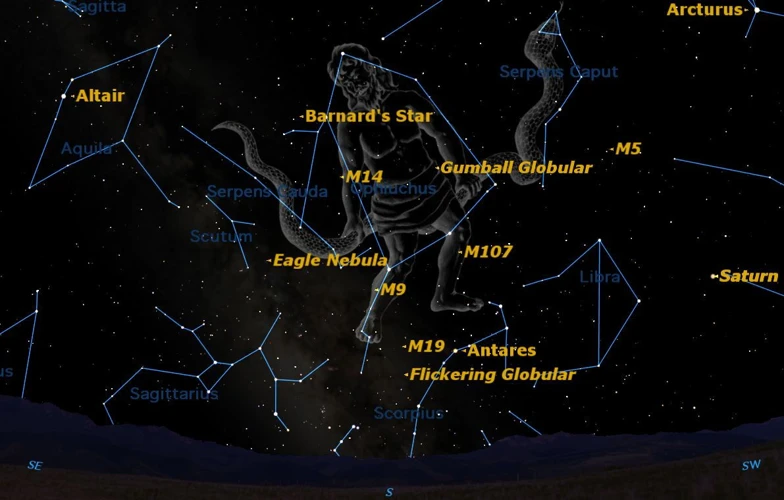
The concept of the zodiac has roots in ancient civilizations, where people relied on celestial observations to navigate the world around them. The 12 zodiac signs that we are familiar with today trace back to the Babylonians, who developed a system based on the annual path of the sun through the constellations. Each sign was assigned specific characteristics and traits based on the position of the sun at the time of a person’s birth. These characteristics were believed to influence one’s personality and destiny. However, while the Babylonians recognized the existence of thirteen constellations, they decided to exclude Ophiuchus from the zodiac, perhaps due to its location near the sun’s path. Despite its omission, Ophiuchus has emerged in modern discussions, captivating the curious and creating a stir among astrologers and enthusiasts alike. So, let us delve into the significance and controversies surrounding Ophiuchus, and how it fits into the broader zodiac system.
The 12 Zodiac Signs
The 12 zodiac signs, namely Aries, Taurus, Gemini, Cancer, Leo, Virgo, Libra, Scorpio, Sagittarius, Capricorn, Aquarius, and Pisces, have long been associated with astrology. Each sign is believed to embody distinct personality traits, characteristics, and qualities that shape an individual’s behavior and destiny. These signs are derived from the positions of the constellations along the ecliptic, the apparent path of the sun across the sky as viewed from Earth. Aries, the first sign of the zodiac, is associated with passion, assertiveness, and leadership. Taurus, an earth sign, is known for its practicality, determination, and reliability. The twins of Gemini represent curiosity, adaptability, and communication skills. Cancers are nurturing, emotional, and intuitive. The charismatic and confident Leo symbolizes creativity and a desire for self-expression. Virgo, an earth sign, values logic, organization, and attention to detail. Libra, represented by the scales, seeks balance, harmony, and fairness. Scorpios are known for their passion, intensity, and deep emotions. Sagittarius, the adventurer, embraces optimism, the pursuit of knowledge, and a love for travel. Capricorns are responsible, ambitious, and driven by a desire for success. The innovative and independent Aquarius is associated with originality, humanitarianism, and a rebellious nature. Finally, Pisces, the dreamer of the zodiac, is imaginative, empathetic, and deeply intuitive. The 12 zodiac signs offer a framework for self-understanding and have been used to analyze relationships, career choices, and personal growth. Exploring each sign in-depth can provide valuable insights into the complexities and diversity of human nature. Interested individuals may find guidance in understanding their zodiac sign’s characteristics and the ways in which they can utilize their strengths in various aspects of life, such as career, inspiration, and self-love.
What is Ophiuchus?
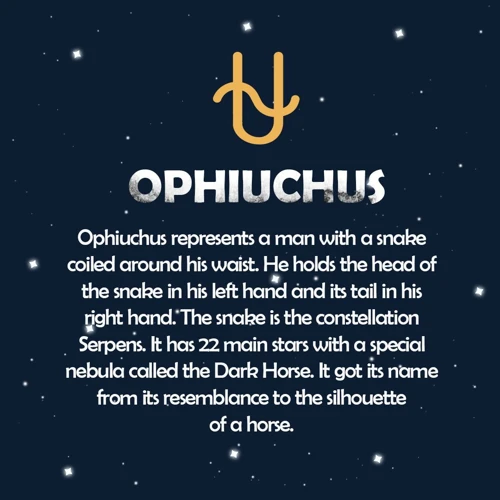
Ophiuchus, also known as the serpent bearer, is a constellation that resides near the celestial equator. It is positioned between Scorpio and Sagittarius and is often depicted as a man holding a serpent. Despite not being officially recognized as a zodiac sign, Ophiuchus has gained attention in recent years. According to some astrologers, Ophiuchus should be considered the thirteenth zodiac sign, with its own set of unique qualities and characteristics. Proponents of Ophiuchus argue that those born between November 29 and December 17 should identify themselves as Ophiuchus instead of their original zodiac sign. However, it is important to note that this perspective is not widely accepted or recognized by the astrological community. Nevertheless, Ophiuchus continues to pique the curiosity of many, prompting discussions about its role in astrology and its influence on individuals’ lives. So, let us explore the controversy surrounding Ophiuchus and delve into the arguments for and against its inclusion in the zodiac.
The Ophiuchus Controversy
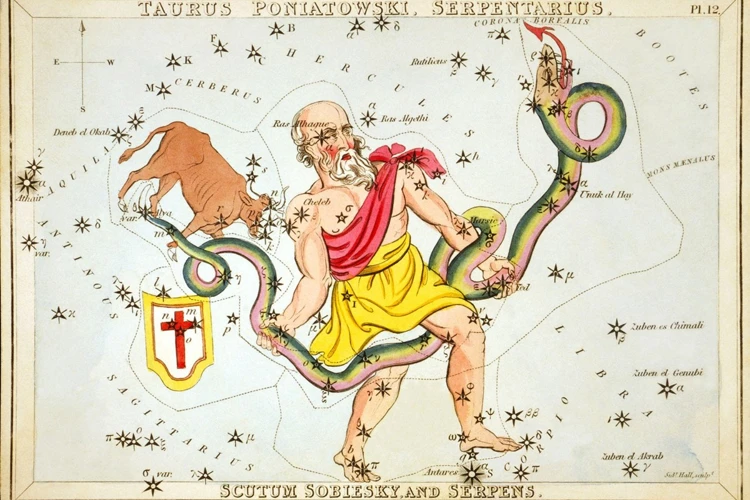
The inclusion of Ophiuchus as a potential 13th zodiac sign has sparked both popularity and misunderstandings. Many astrologers argue that Ophiuchus should be recognized and incorporated into the zodiac system due to its alignment with the ecliptic, the apparent path of the sun. They believe that individuals born between November 29th and December 17th should embrace the traits and attributes associated with this celestial figure. However, some critics question the validity of Ophiuchus as a zodiac sign, citing astrological inconsistencies and the longstanding tradition of the 12 zodiac signs. They argue that Ophiuchus was omitted for practical reasons, such as maintaining symmetry and ease of use. Unlike the other zodiac signs, Ophiuchus does not have a corresponding planet ruling it, adding to the skepticism surrounding its inclusion. Despite the controversies and differing opinions, Ophiuchus continues to captivate and intrigue those seeking a deeper understanding of astrology. So, whether you are an astrological enthusiast or a curious skeptic, the Ophiuchus controversy invites us all to question and explore the intricacies of the zodiac.
Popularity and Misunderstandings
Since its introduction into popular culture, Ophiuchus has gained a significant following, with many individuals identifying themselves as Ophiuchus. This surge in popularity can be attributed to various factors, such as social media trends and the novelty of being associated with a lesser-known zodiac sign. However, it is important to note that the addition of Ophiuchus as a zodiac sign is widely misunderstood.
One common misconception is that the addition of Ophiuchus changes the dates and characteristics of all the zodiac signs. This belief stems from a misinterpretation of the astrological system and the alignment of the constellations with the zodiac signs. In reality, the zodiac signs are determined by the position of the sun on specific dates, regardless of the constellations in the sky.
Some people mistakenly believe that Ophiuchus represents a shift in the personality traits associated with their sign. However, astrology focuses on the influence of celestial bodies, not constellations, on a person’s character. The addition of Ophiuchus does not alter the established characteristics of the existing zodiac signs.
Astronomical vs Astrological Zodiac
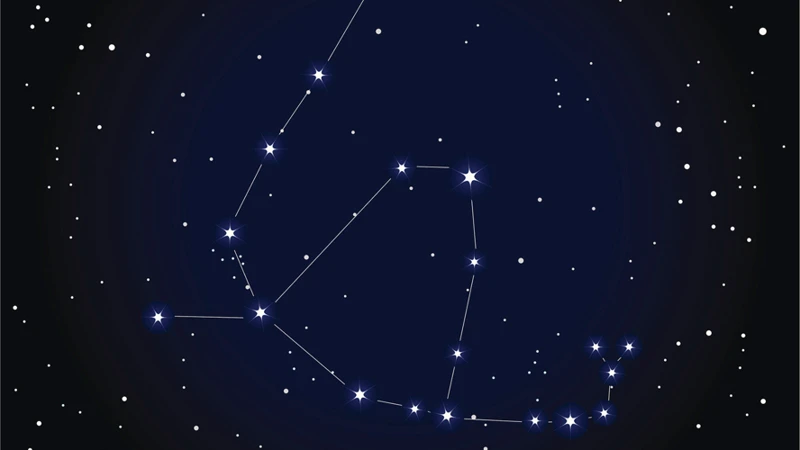
The astronomical zodiac and the astrological zodiac may sound similar, but they have distinct differences in their meanings and applications. The astronomical zodiac is based on the actual positions and movements of celestial bodies, primarily the sun and the stars. It is a scientifically observed and measured system that astronomers use to study the universe. Astronomers divide the sky into constellations, groups of stars that form recognizable patterns. The sun’s apparent path throughout the year passes through these 13 constellations, including Ophiuchus. In contrast, the astrological zodiac is a symbolic system based on ancient beliefs and interpretations. Astrologers assign meaning to the celestial bodies’ positions and interpret their influence on human lives. The astrological zodiac consists of the familiar 12 zodiac signs, corresponding to specific dates of birth. These signs represent different personality traits and characteristics believed to influence an individual’s life events and relationships. While the two systems share some similarities, it is crucial to understand their distinctions. The astronomical zodiac is rooted in scientific observation, while the astrological zodiac is steeped in symbolism and interpretation. When discussing Ophiuchus’s place in the zodiac, it is essential to differentiate between the two systems and how they are used.
The Precession of the Equinoxes
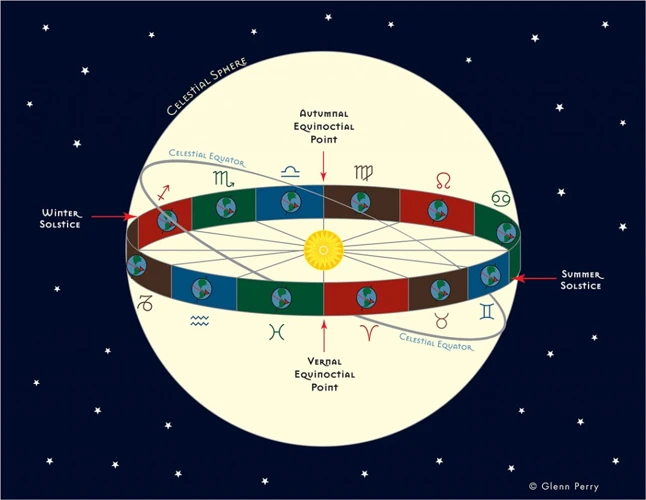
One of the key factors that contribute to the controversy surrounding Ophiuchus is the phenomenon known as the precession of the equinoxes. This is a natural occurrence caused by the Earth’s wobble on its axis, which results in a gradual shift in the alignment of the Earth’s rotation axis relative to the fixed stars. The precession causes the position of the equinoxes, the points where the Sun’s path intersects the celestial equator, to slowly move over time. As a result, the dates associated with each zodiac sign have shifted since the Babylonians first established the zodiac system thousands of years ago. This means that the Sun no longer aligns with the same constellation during the same dates as it did in ancient times. Some proponents of Ophiuchus argue that this shift justifies the inclusion of the 13th sign, as the dates assigned to zodiac signs may no longer accurately align with the Sun’s placement in the sky. However, the practice of astrology has traditionally relied on the tropical zodiac, which is based on the position of the Sun relative to the Earth’s seasons. So, while the precession of the equinoxes is a fascinating astronomical phenomenon, its impact on the astrological zodiac remains a subject of debate and interpretation.
The Earth’s Wobble
The Earth’s wobble, also known as precession, plays a crucial role in understanding the zodiac and the movement of the constellations. Precession is a gradual shift in the Earth’s rotation axis caused by external forces acting on the planet. Instead of staying fixed, the Earth’s axis traces a circular path, completing a full cycle approximately every 26,000 years. This wobble affects the position of the celestial equator and the vernal equinox, which in turn impacts the alignment of the zodiac signs.
To grasp this concept, imagine the Earth spinning like a top. However, the axis of rotation is not perfectly perpendicular to its orbital plane around the Sun. Instead, it is tilted at an angle of about 23.5 degrees. This tilt is responsible for the changing seasons and the varying lengths of day and night throughout the year. But over time, the gravitational influences of the Moon and the Sun cause a slow, continuous shift in the orientation of the Earth’s axis.
This shift affects the position of the vernal equinox, the point at which the Sun’s path intersects the celestial equator during the spring equinox. Traditionally, this point marks the beginning of the zodiac. Due to precession, the vernal equinox gradually moves backward through the constellations, at a rate of about one degree every 72 years. This movement is known as the precession of the equinoxes.
As a result of the Earth’s wobble, the alignment of the zodiac signs has shifted since their introduction by the Babylonians. The sun signs are now approximately one constellation out of sync with the traditional astrological dates. This discrepancy sparks intriguing discussions and leads some to question the validity of astrology as a predictive tool. However, it’s important to note that astrologers take the precession of the equinoxes into account and consider the tropical Zodiac, which remains linked to the seasons rather than the actual position of the constellations.
The Earth’s wobble, or precession, directly impacts the zodiac system by causing a shift in the alignment of the constellations and the vernal equinox. This phenomenon has led to discrepancies between the traditional astrological dates and the actual position of the sun at the time of birth. While the Earth’s wobble may challenge certain aspects of astrology, it also highlights the rich and dynamic nature of our universe, inviting us to explore and question our understanding of the cosmos.
Ophiuchus Traits and Compatibility

are a subject of interest and speculation among astrology enthusiasts. Ophiuchus, as the 13th zodiac sign, is often associated with unique personality traits and characteristics. People born under this sign are believed to possess qualities such as determination, intelligence, and a deep sense of introspection. They are thought to be natural healers, with a profound connection to spirituality and the metaphysical realm. However, as Ophiuchus is not officially recognized in traditional astrology, its compatibility with other zodiac signs is a topic of debate. Some believe that Ophiuchus is compatible with specific signs due to shared traits, while others argue that the absence of Ophiuchus in the traditional zodiac renders compatibility discussions irrelevant. Whether you are a believer or a skeptic, exploring the traits and compatibility of Ophiuchus sheds light on the diverse world of astrology and the intricacies of human connection.
Characteristics and Personality
When it comes to the characteristics and personality of Ophiuchus, there is a wide range of traits associated with this unique zodiac sign. Ophiuchus individuals are often described as insightful and wise, possessing a deep understanding of the world around them. They have a thirst for knowledge and are constantly seeking to expand their horizons. They are known to be great problem-solvers, using their analytical and logical thinking skills to approach challenges. This sign is also associated with healing and medicine, as Ophiuchus symbolizes the serpent holder, a symbol of wisdom and rejuvenation. Ophiuchus individuals are often compassionate and empathetic, driven by a desire to help others. They have a natural ability to connect with people on a deeper level and provide support and guidance. On the flip side, Ophiuchus individuals can also be highly competitive and driven, always striving for excellence. They have a strong sense of determination and are not easily deterred by obstacles. However, Ophiuchus individuals can sometimes be seen as enigmatic and mysterious due to their complex nature. Despite the misconception that Ophiuchus represents a fixed set of traits, like any other zodiac sign, individuals within this sign can exhibit a vast range of unique personalities and characteristics.
Compatibility with Other Signs
Compatibility with Other Signs:
When it comes to compatibility with other signs, Ophiuchus tends to be a bit of a mystery. Since it is not officially recognized as a zodiac sign in mainstream astrology, there are no established compatibility guidelines specifically tailored to Ophiuchus individuals. However, some astrologers believe that Ophiuchus shares traits with neighboring signs, which may offer some insights into compatibility.
Those born under Ophiuchus are said to possess characteristics that align with Sagittarius and Scorpio. This means that they may find compatibility with individuals born under these signs. Those influenced by Sagittarius can bring optimism, adventure, and a broader perspective to Ophiuchus relationships. On the other hand, the influence of Scorpio can add intensity, passion, and emotional depth to their connections.
It is important to note that compatibility in astrology is not solely based on the sun sign. Factors such as moon sign, rising sign, and other planetary placements also play a significant role in determining compatibility. Regardless of an individual’s sun sign, it is advisable to consider the complete birth chart to get a more accurate understanding of compatibility.
Since compatibility with Ophiuchus is not well-defined, it offers a unique opportunity for those born under this sign to explore and forge connections with all zodiac signs. By embracing their individuality and open-mindedness, Ophiuchus individuals may discover unexpected and fulfilling relationships with a wider range of people.
While there may be no set guidelines for compatibility, it is important to remember that astrology serves as a tool for self-awareness and understanding, rather than absolute destiny. Relationships are complex, and shared values, communication, and mutual respect ultimately play a more significant role in fostering harmonious connections than sun sign alone.
So, if you’re an Ophiuchus individual seeking compatibility with other signs, embrace the exploration and discover the unique dynamics that unfold in your relationships.
Scientific Consensus and Astrology
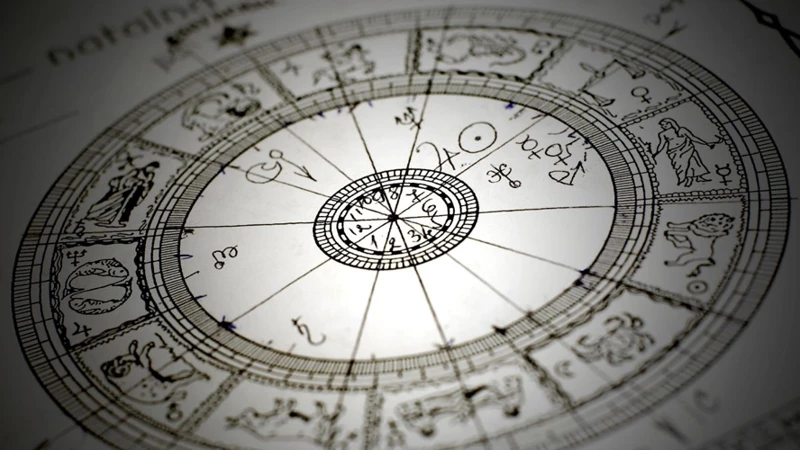
When it comes to astrology, the scientific community remains skeptical. Astrology is widely regarded as a pseudoscience due to its lack of empirical evidence and reliance on unfalsifiable claims. Science demands rigorous testing and reproducibility, which astrology often fails to provide. The predictions and personality interpretations associated with astrology are often vague and general enough to apply to various individuals, making it difficult to pinpoint accurate and specific outcomes. While astrology can bring comfort, guidance, and a sense of purpose to many individuals, it is important to recognize that its validity is not supported by the scientific method. Instead, astrology is considered more of a cultural and personal belief system rather than a science. So, while it may be entertaining and intriguing to explore the zodiac signs and their meanings, it’s essential to approach astrology with a critical mindset and understand that its claims should be taken with a grain of salt.
Astrology as a Pseudoscience
Astrology has long been a subject of debate among scientists and skeptics, with many categorizing it as a pseudoscience. Let’s explore some of the main reasons why astrology is often regarded as such:
1. Lack of Empirical Evidence: One of the primary criticisms of astrology is the absence of empirical evidence to support its claims. Scientific theories and disciplines rely on rigorous experimentation and observation, but astrology lacks consistent and reliable evidence to validate its predictions and explanations.
2. Biased Interpretation: Astrology often relies on subjective interpretation rather than objective analysis. The same birth chart or horoscope can be interpreted differently by different astrologers, leading to varied interpretations and predictions. This lack of consensus hampers astrology’s credibility as a scientific discipline.
3. Barnum Effect and Confirmation Bias: The Barnum effect, also known as the Forer effect, suggests that people tend to believe generic or vague descriptions about themselves if they perceive them as tailored specifically to them. This psychological phenomenon plays a significant role in astrology, where horoscopes provide generalized statements that can be interpreted to fit almost anyone’s life experiences, fostering a sense of confirmation bias.
4. Incompatibility with Established Scientific Principles: Astrology’s reliance on celestial bodies and their influence on human behavior contradicts established scientific principles. It fails to provide a plausible explanation for the mechanism by which celestial bodies can exert such influence on human life, as well as the absence of a proven causal relationship between celestial events and human experiences.
5. Failed Predictions: Another point of contention is astrology’s history of failed predictions. While some may argue that astrology is intended to provide guidance rather than precise predictions, the lack of consistent and accurate predictions raises doubts about its reliability and legitimacy.
It is important to note that astrology still holds cultural and personal value for many individuals and can provide a source of comfort, self-reflection, and self-discovery. However, from a scientific standpoint, astrology is often viewed as a pseudoscience due to its lack of empirical evidence, biased interpretation, incompatibility with established scientific principles, and history of failed predictions.
Conclusion
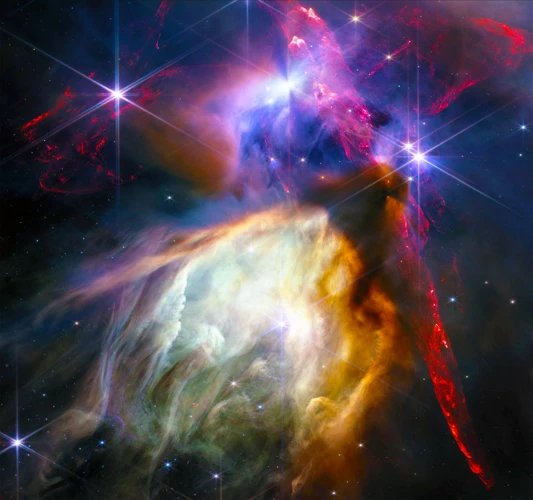
In conclusion, the controversy and fascination surrounding Ophiuchus highlight the complexity and diversity of our understanding of astrology and the zodiac. While Ophiuchus may not be officially recognized as a zodiac sign in mainstream astrology, its existence and significance cannot be denied. The origin of the zodiac and the exclusion of Ophiuchus from the traditional system provide an interesting historical context. The astronomical versus astrological debate brings to light the differing perspectives on how we interpret celestial bodies and their influence on human lives. Furthermore, the precession of the equinoxes reminds us of the dynamic nature of our universe and the constant motion of our planet. Ophiuchus, with its unique traits and compatibility, adds a fascinating dimension to the study of astrology. However, it is important to acknowledge the scientific consensus that astrology is considered a pseudoscience, lacking empirical evidence for its claims. Despite this, astrology continues to captivate and provide guidance for many individuals. Whether you embrace astrology as a belief system or approach it with skepticism, the allure of Ophiuchus and the zodiac as a whole remains a topic of intrigue and speculation.
Frequently Asked Questions
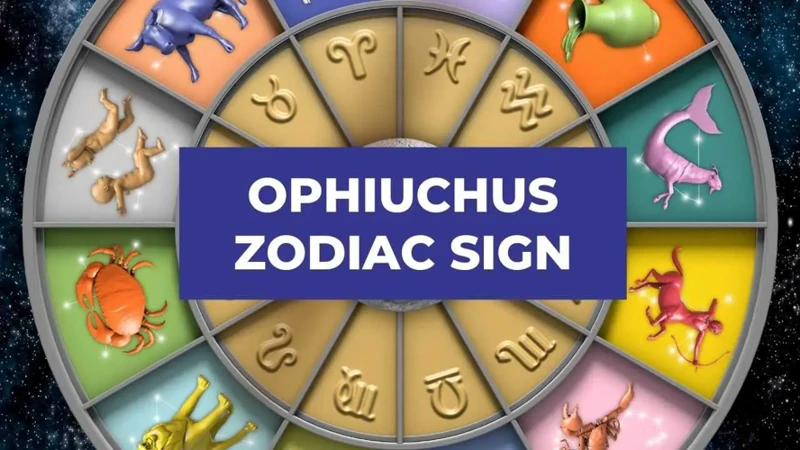
What is the significance of Ophiuchus in astrology?
Ophiuchus is often regarded as the 13th zodiac sign, despite not being officially recognized in traditional astrology. Some believe that Ophiuchus represents a transformative and healing energy that can bring balance and wisdom to the zodiac.
Why was Ophiuchus excluded from the traditional zodiac?
The Babylonians, who established the original zodiac system, chose to work with 12 signs to align with the number of months in a year. Ophiuchus, located near the sun’s path, was not included to maintain this symmetry.
Does the inclusion of Ophiuchus change my astrological sign?
If you’ve identified with a specific zodiac sign based on traditional astrology, the inclusion of Ophiuchus does not change your sign. The traditional system remains widely practiced and recognized.
What are the traits associated with Ophiuchus?
Those associated with Ophiuchus are often described as ambitious, curious, intuitive, and possessing a strong desire for knowledge and spiritual growth. They are believed to have a gift for healing and transformation.
Can Ophiuchus be considered the “new” or “13th” zodiac sign?
While Ophiuchus has gained attention as a potential addition to the zodiac, it is important to note that the traditional 12-sign system is widely accepted and practiced. Consider Ophiuchus as an alternative perspective rather than a replacement.
Are Ophiuchus individuals compatible with other zodiac signs?
Compatibility between Ophiuchus individuals and other signs depends on various factors, including the specific traits and dynamics of both individuals. Like with any other sign, relationships can thrive with understanding, respect, and open communication.
Do astronomers consider Ophiuchus a zodiac sign?
No, astronomers do not recognize Ophiuchus as a zodiac sign. In the scientific community, the zodiac refers to the 12 constellations that lie along the ecliptic, which is the apparent path of the sun across the sky.
Is Ophiuchus only associated with astrology or does it have a connection to astronomy as well?
Ophiuchus is primarily associated with astrology, as it is not officially recognized in the field of astronomy. Astronomically, Ophiuchus is considered a constellation located between Scorpius and Sagittarius.
Why has Ophiuchus gained popularity in recent times?
Ophiuchus has gained popularity due to the spread of information and discussions on social media platforms. Some people resonate with the characteristics and symbolism associated with Ophiuchus, leading to increased interest and curiosity.
What does the controversy surrounding Ophiuchus mean for astrology’s credibility?
The controversy surrounding Ophiuchus highlights the ongoing debate within the astrology community and its relationship with scientific scrutiny. While astrology remains a subject of interest for many, it is important to recognize that it is not considered a scientifically-proven practice.
References
- the 13th zodiac (ophiuchus) and the galactic solar system …
- Fact Check-False posts about NASA changing the zodiac …
Frequently Asked Questions

1. Is Ophiuchus a new zodiac sign?
No, Ophiuchus is not a new zodiac sign. It has been known for centuries but is not officially recognized as one of the 12 zodiac signs.
2. Why is Ophiuchus not included in the zodiac?
Ophiuchus is not included in the zodiac because the zodiac system was developed thousands of years ago and is based on the movement of the sun through only 12 specific constellations.
3. What are the characteristics of Ophiuchus?
Ophiuchus is said to have traits such as being curious, charismatic, and passionate. They are known for their desire for knowledge and their ability to heal and bring about positive change.
4. Can Ophiuchus be compatible with other zodiac signs?
While Ophiuchus is not officially recognized as a zodiac sign, some astrologers believe that it can have compatibility with other signs based on its characteristics and traits.
5. Does the existence of Ophiuchus change my zodiac sign?
No, the existence of Ophiuchus does not change your zodiac sign. The astrological system remains the same with 12 zodiac signs, and your sign is determined by the position of the sun at the time of your birth.
6. Is Ophiuchus mentioned in ancient astrology texts?
Yes, Ophiuchus is mentioned in some ancient astrology texts, but its significance has varied throughout history, and it has not been widely accepted as one of the zodiac signs.
7. Can Ophiuchus influence my horoscope?
Since Ophiuchus is not officially recognized as a zodiac sign, it does not typically influence horoscopes or astrological readings. However, some astrologers may consider it in their interpretations.
8. Are there any famous people born under the sign of Ophiuchus?
There are no famous individuals who are officially recognized as being born under the sign of Ophiuchus. However, there may be individuals who identify with Ophiuchus traits or relate to its symbolism.
9. Do astronomers consider Ophiuchus as a zodiac sign?
No, astronomers do not consider Ophiuchus as one of the zodiac signs. Astronomical constellations and the astrological zodiac are separate systems with different purposes and definitions.
10. Is Ophiuchus an important part of astrology debates?
Ophiuchus has become a topic of debate and discussion within astrology, but its importance varies among astrologers. Some see it as an opportunity to expand the zodiac, while others view it as unnecessary or inconsistent with traditional astrological practices.
References
- Ophiuchus, the 13th Zodiac Sign
- Fact Check-False posts about NASA changing the zodiac …
- NASA: No, we haven’t changed your zodiac sign






